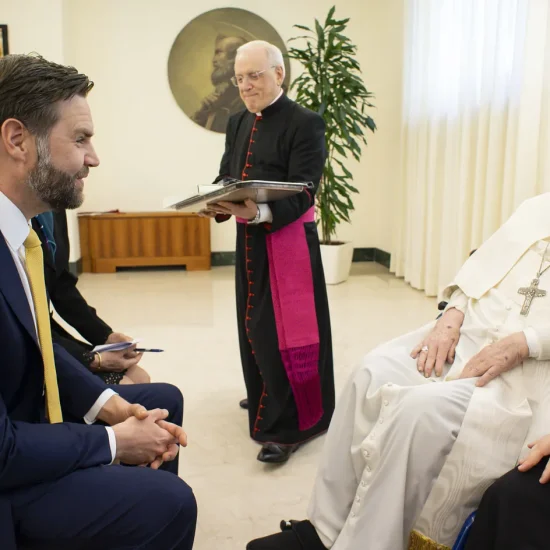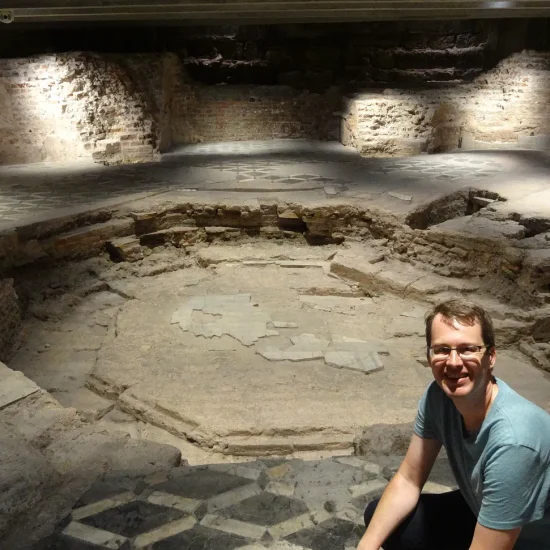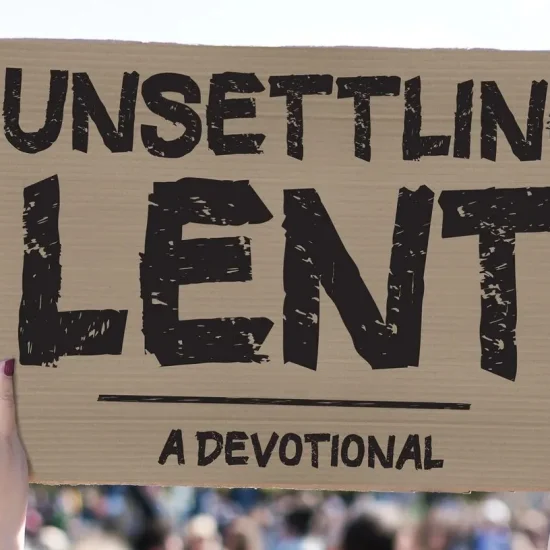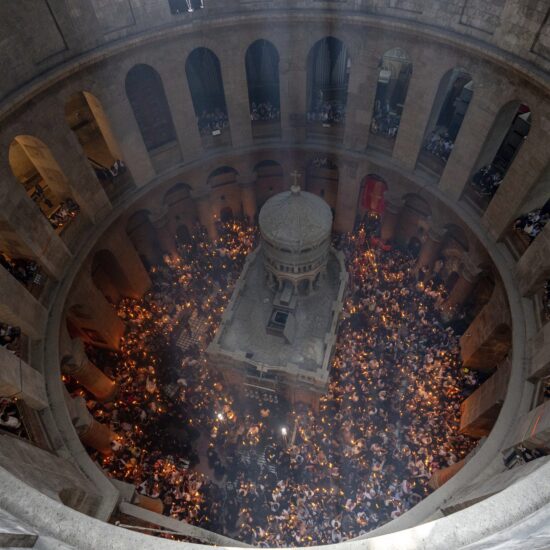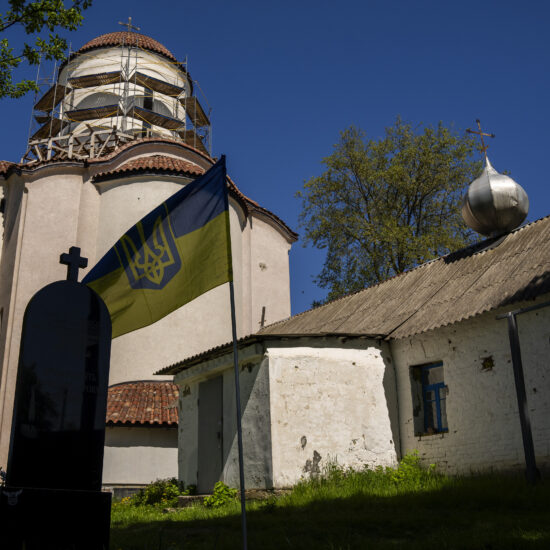Easter Sunday — the celebration of the resurrection of Jesus Christ — is for Christians the culmination of their community life, expressing the heart of their faith. But among Baptists and other evangelicals, an intentional period of preparation for their holiest day is often understated or absent — in contrast to Christmas, the other great Christian observance, typically the focus of elaborate church festivities for weeks prior to Dec. 25.
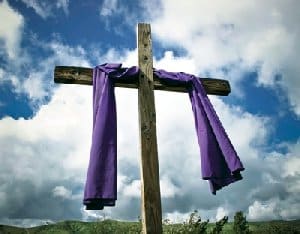
|
Many Baptists are seeking to reclaim that pre-Easter focus — historically called Lent — which has been an integral part of many Christians’ experience since the earliest years of the church.
“It’s a biblical thing, not a made-up Catholic thing,” says Kyle Henderson, pastor of First Baptist Church in Athens, Texas, acknowledging a robust Baptist suspicion of spiritual practices seen as too closely associated with the Roman Catholic Church or its distant cousins, the Anglicans.
Lost treasure
Some Baptists say they sense those suspicions — in part a legacy of the Protestant Reformation — have left them with a diminished spiritual vocabulary.
“There is an uneasy sense that something got lost,” says Phyllis Tickle, whose 2008 book, The Great Emergence, chronicles the blurring of denominational distinctions in late 20th- and early 21st-century American Christianity.
Every 500 years or so, says Tickle, the church metaphorically holds a great rummage sale, “getting rid of the junk that we believe no longer has value and finding treasures stuck in the attic because we didn’t want them or were too naïve to know their true worth.”
The Reformation was one of those rummage sales and the current “great convergence” is another, she maintains. For evangelicals, the long-forgotten treasures in the attic include a wide array of spiritual disciplines — including Lent — with roots in the church’s first centuries.
For Sterling Severns, discovering Lent and other seasons of the Christian year was “an eye-opening experience,” which he encountered at the first church he served after graduating from seminary.
“It tapped into something in me that surprised me,” says Severns, now pastor of Tabernacle Baptist Church in Richmond, Va. “I remember I almost felt as if I’d been let in on a great secret.”
Lenten practice
Lent — a 40-day period of fasting and self-sacrifice preceding Resurrection Sunday — began as early as the second century, probably as a period of preparation for new Christians who were to be baptized on Easter. Eventually the entire Christian community, not just baptismal candidates, observed the fast. Among Christians in Western Europe it universally began on Ash Wednesday and culminated in Holy Week — the days just before Easter that include Maundy Thursday, Good Friday and Holy Saturday.
After more than a millennium as an essential element of spiritual formation, Lent and other spiritual practices were reduced in importance as unbiblical innovations by the Protestant Reformers and eliminated entirely by the Baptists who emerged from their influence. Today some Baptists who are recovering disciplines like Lent say they’re struck by their spiritual richness.

Photo by Sterling Severns
|
First Baptist Church in Richmond, Va., inaugurates Lent with an Ash Wednesday service — in which the ash of burnt palm branches are imposed on worshipers foreheads — and in the last week includes a contemplative service, involving a rhythm of Scripture and devotional readings, silences and meditative songs.
“I’m surprised at how much our folks have embraced [the services],” says Lynn Turner, senior associate pastor at First Baptist, who is staff liaison for the events. “Not just accept — embrace.”
Turner attributes that response in part to the use of prolonged silences.
“It’s simply a time to be quiet,” she said. “Complete silence is a form of prayer we almost never use. We don’t have periods of sustained silence — of even three to five minutes — in our traditional worship services. The rhythm of the contemplative service is different.”
“Lent gives us another song to sing as a congregation,” said Keith Herron, pastor of Holmeswood Baptist Church in Kansas City, Mo. “It leads us to the tomb, but it doesn’t spring the door open too quickly.”
Holmeswood observed Lent for years before it began an Ash Wednesday service, but Herron said an intentional, mid-week start to the season has enhanced the church’s approach.
“Ash Wednesday is a decidedly darker theme that might not work on Sunday morning,” he said. But engaging that somber theme helps “round out a wider version of our story.”
“The evangelical trap is to have too many answers which jump around the puddle of the darker themes,” said Herron. “Lent allows us to jump into the puddle — not to be obsessed with it, but to realize there is a darker theme that we have to acknowledge. It speaks against the superficiality that will not embrace the full story.”
Season of the Cross
While Baptists in the East Texas region that includes Athens may not warm up to the idea of observing Lent, congregants at First Baptist wholeheartedly embrace periods of spiritual self-examination, confession and prayer during what they call the “Season of the Cross” in the weeks leading up to Easter.
“Lent is not a biblical word, and it can be a disturbing word for some people who didn’t grow up with that tradition,” Pastor Henderson said. “I don’t care about our people being committed to Lent. I care a lot about them being committed to Lenten ideas.”
First Baptist in Athens does not rigidly adhere to a liturgical Christian calendar, but Henderson estimates he has led some sort of Ash Wednesday observance during his 14 years at the church — normally during a regularly scheduled Wednesday evening prayer service.
Typically, the service involves members writing their sins on slips of paper, collecting and burning the folded pieces of paper, and having their foreheads marked with the sign of the cross using those ashes.
Touching the emotions
Baptists involved in intentional preparation for Easter — whether referred to as Lent or some other name — view it as an effective tool for teaching and spiritual formation.
Lenten practices can help Baptists get in touch with an often-neglected side of worship — the emotional dimension, said Bill Tillman, who holds the T.B. Maston Chair of Christian Ethics and teaches spiritual formation at Hardin Simmons University’s Logsdon Seminary in Abilene, Texas.
“It’s appropriate to grieve over one’s sins and to grieve the death of Jesus. At the same time, Easter should be the ultimate celebration for Christians,” he said. “Spiritual disciplines are things that can help people get into the emotional side of their faith practice, experiencing grief and delight.”
The Lenten season, as a key part of the Christian calendar, helps Christians move through the salvation story in an orderly way and incorporate the rhythms of the Christian year into daily living, he noted.
This year, Second Baptist Church in Liberty, Mo., will focus on a different spiritual practice each week of Lent, said pastor Jason Edwards.
“I’ve been influenced by writers like Dorothy Bass who have reminded us that many of the things we do together as a faith community are spiritual practices that shape our lives,” said Edwards. “The practice of organizing our year on the rhythm of the Christian calendar is in this vein. It shapes our lives and our faith communities.”
“The rhythm of the Christian year takes us into the rhythm of Christ’s life,” he added. “We are embodying Christ’s story as a community. We’re living it.”
Teaching time
Severns called Ash Wednesday “a teaching day.”
“Our service is a way of teaching people what it means” — a key consideration in a church which had never observed Lent before Severns was called as pastor.
“I was really nervous about the imposition of ashes the first time we did it. But we found way more people came than we expected, and that included the older generation — traditional Baptists — who fell in love with it.”
Severns, an artist whose photography is exhibited in the church, uses photos to remind the congregation of its sense of community. Images of all congregants whom he has shot over the past seven years — now including some who have died and children who have grown — are projected on a wall throughout the service.
“We pull out all the stops to enhance our sense of unity as a community,” he says.
Community is essential to spiritual formation at Mosaic, a congregation in Austin, Texas, with Baptist ties and roots in the city’s lively artistic scene. In recent conversations held between Mosaic’s leadership and its worshippers to determine how the church had contributed to spiritual development, one theme emerged repeatedly, said pastor Don Vanderslice.
“It was how important observing the Christian year — including Lent — had been in their spiritual formation,” he said. “Focusing on the seasons of the church year reminds us that the spiritual life is a journey. … The idea behind journey or pilgrimage is that we’re going somewhere, and not just landing on a holiday here and there. When we follow the Christian calendar, we’re saying something about our priorities and about our lives, holistically and spiritually. It says a lot about us. And the calendar gives us a way of remembering our story.”
For Henderson, Ash Wednesday is a two-fold teaching experience. First, he emphasizes the Old Testament meaning of bearing a mark and using ashes as a sign of repentance. At the same time, he explains the meaning of terms such as Lent so members who did not grow up in churches that follow liturgical practices will understand what fellow Christians do during the weeks leading to Easter.
“It’s a way to connect to the broader Christian world,” he said.
Focus on the cross
The Athens church marks the Season of the Cross by erecting two crosses — a 9-foot cross suspended by ropes in the middle of the sanctuary to help worshippers focus and a 30-foot cross outside on the church grounds to draw the attention of people who pass by.
Worship services during the weeks leading to Easter include a progressively greater emphasis on the cross, Henderson noted. Small-group Bible studies also focus on themes appropriate to the emphasis.
“There’s a change in the tone of the worship services. They are more introspective, with seasons of confession. They tend to be quieter, and our contemporary service features more unplugged acoustic music than usual,” he said.
This year, the church will set up two stations in the sanctuary where people can write down confessions of sin and prayer requests during worship services, then leave them tucked away.
“It’s sort of like a Wailing Wall where people leave their prayer requests,” Henderson explained. “It is a physical, tactile experience. We try to involve all the senses.”
Some years, the church observes the Lord’s Supper on Maundy Thursday — the Thursday prior to Easter, when Jesus instituted the ordinance — and incorporates teaching about the Passover. Typically, a 7 a.m. service on Good Friday will involve members moving through the Stations of the Cross, reading Scripture and reflecting at each location.
On the evening before Easter, church members gather at the church to decorate the outdoor cross with flowers so it will be covered when people see it the next morning.
Chuck Warnock, pastor of Chatham (Va.) Baptist Church, says Lent and other elements of the Christian year can be a counter-cultural response to society’s pressures.
“The fact is, if we don’t have some kind of spiritual calendar, then we cede our entire lives to the secular calendar or the sports calendar or the shopping calendar,” he said. “No matter what you call it or whether your follow all its intricacies, it’s a calendar that speaks to our spiritual walk and development.”
A counter-cultural response also resonates at Mosaic — and with its musicians, painters, designers and writers. “Throughout the year we draw attention to the fact that what we do in worship distinguishes us from the rest of the culture,” said Vanderslice. “We measure our time differently. It’s a radical way of marking time and embracing what Christians for 2,000 years have felt was valuable.”
“We need liturgy that calls us out of the fast pace of our American culture and invites us to enter into the paces of Sabbath, reflection, confession, purging and repentance,” said Edwards. “Lent helps us with this.”
Robert Dilday is managing editor of the Virginia Religious Herald. Ken Camp is managing editor of the Texas Baptist Standard.

